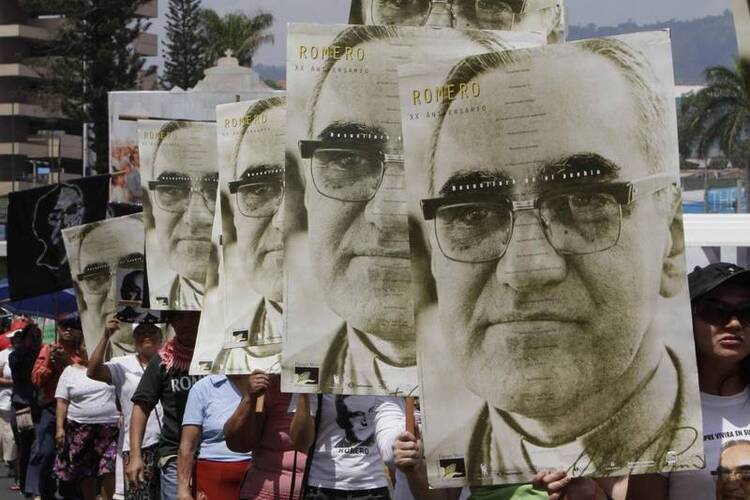Protect the Records
For decades the staff of Tutela Legal, the legal aid office of the archbishop of San Salvador, has collected evidence of human rights violations and provided legal services to survivors and families of victims of crimes committed during the civil war that raged in El Salvador from 1980 to 1992. When the staff arrived at work on Sept. 30, they found locked doors and security guards and were informed that Archbishop José Escobar Alas had ordered the office closed.
Founded by Archbishop Oscar Romero, Tutela Legal had records that include documentation of the archbishop’s assassination as well as of the murders of six Jesuit priests and their housekeeper and her daughter in 1989. The closure came just 10 days after the country’s Supreme Court took on a case challenging the constitutionality of the 1993 amnesty law, which protects government, military and guerilla leaders from prosecution for war crimes. Archbishop Escobar, who cited legal malfeasance and the diminished relevance of the office as the rationale behind his decision, has since announced the creation of a commission that will take over the work of Tutela Legal and pave the way for a new human rights organization.
A group of human rights organizations penned an open letter to the archbishop offering forward-looking and measured recommendations. They call for the new commission to “reflect the values and moral and ethical commitments of Tutela Legal” and rightly emphasize the need to preserve the integrity of the archives and ensure that they are made available to researchers and prosecutors. The fight against impunity, they write, “is not yet over.”
In Omnibus Caritas
The Catholic Theological Society of America is to be commended for a new set of guidelines that seek to create more space for a diversity of viewpoints within the guild. The C.T.S.A. announced the changes after the release of a committee report that cited a failure to adequately represent more “conservative” perspectives at the society’s meetings. “The self-conception of many members that the C.T.S.A. is open to all Catholic theologians is faulty and self-deceptive,” the committee wrote.
Richard Gaillardetz, president of the society, said the C.T.S.A. should strive to be “a ‘big tent’ professional society that models in its attitudes and policies a commitment to the full catholicity of our theological tradition.” Amen. The Catholic tradition has always been marked by a wonderful diversity of voices. The society’s commitment to representing that diversity fairly is a sign of the organization’s health and good judgment. Not every academic guild is open to such an examination of conscience.
One of the proposed guidelines is a commitment to a “hermeneutic of generosity” when engaging with people of differing viewpoints. We here at America might opt for a simpler term: charity; “Pursuing the truth in charity” is the foundational mission of America. The C.T.S.A.’s commitment to a spirit of generosity parallels our mission to feature a true variety of Catholic viewpoints in our pages.
The society has also made a commitment to include a diversity of “ecclesial sensibilities” at their meetings and to be respectful when criticizing church teaching. This, too, is a welcome sign.
Get the Lead Out
The devastating impact of lead exposure on childhood development has been well documented, and appropriate measures have been taken to contain contamination in societies that can afford such mitigation campaigns. But in the impoverished world, lead exposure remains a serious threat. Lead exposure still causes 143,000 deaths and 600,000 new cases of children with intellectual disabilities every year, according to the World Health Organization.
In cultures where resource extraction or manufacturing are poorly regulated and safety standards for workers or residents living nearby factory or mining sites can be blithely ignored, lead poisoning can be acute and fatal. The dramatic rise in international gold prices, for example, encouraged unregulated, small-scale gold mining in Nigeria. Child laborers in the State of Zamfara were exposed to lead dust churned up during work activities or when it was carried home on clothing. According to Human Rights Watch, at least 400 children have died there of lead poisoning since 2010 and another 2,000 required urgent treatment.
The number of nations that still accept lead in fuel and paints has dropped significantly, though some remain, including nations that export lead-contaminated products, many of them toys, to the United States. Children can still be protected if more direct assistance is offered now. Trade agreements should be established to protect vulnerable communities, and more economic and diplomatic pressure should be brought to bear on exporters of this entirely preventable contamination. As the U.N. special rapporteur on toxic waste, Marc Pallemaerts, said on Oct. 21: “We simply cannot wait another century to eliminate the use of lead.”








